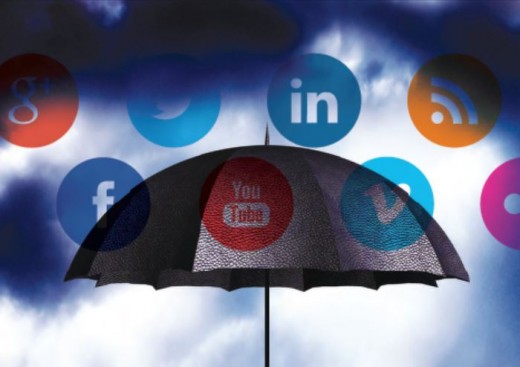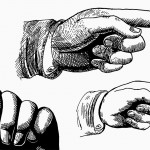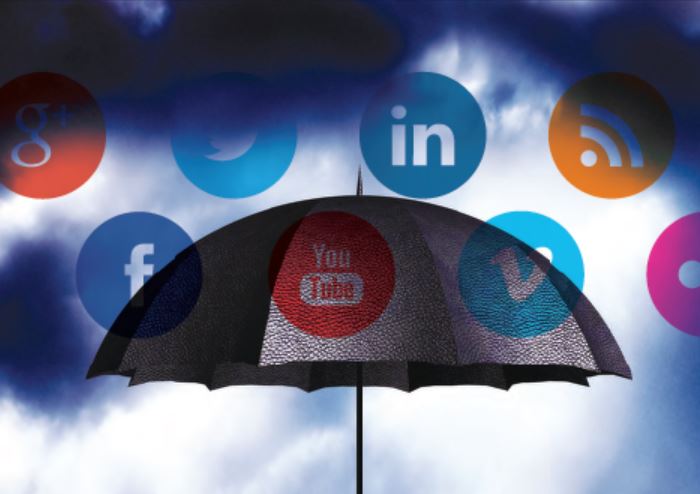The Dark Side of Social Media
January 16, 2016

SOCIAL MEDIA HAS CROSSED OVER INTO BUSINESS from its origins as a virtual playground for adolescents and young adults. Now, the power of social media can benefit or tarnish a company. Businesses seeking to leverage this online medium need to be mindful of their actions and reputations, say social media business experts.
While a company’s online content and corporate personality can be curated with strategic deliberation, maintaining a good reputation poses challenges that are best met quickly. Or, even better, anticipated.
As an example of a windfall from social media, consider the highly successful 2014 “Ice Bucket Challenge.” People asked friends via Facebook, Instagram, Twitter and other social media to show support for individuals with amyotrophic lateral sclerosis, commonly known as ALS. Participants were asked to either dump a bucket of ice on their heads or make a financial donation to the ALS Association. The association did not plan this program but benefited tremendously. As the campaign took hold, donations topped US$ 114 million.
While social media has tremendous power to help, it can also destroy a company or reputation.
 It was in the early days of social media when Martin Leuw, a Young Presidents’ Organization member in London since 1997, discovered the darker side.
It was in the early days of social media when Martin Leuw, a Young Presidents’ Organization member in London since 1997, discovered the darker side.
A decade ago, the software firm he built was at the height of its success after enjoying an eight-year period of sustainable growth. However, the launch of a new payroll software system led to a series of unexpected events that not only threatened the company’s reputation, but also risked potential harm to Leuw and his family.
“We released the product without sufficient testing on the low-tech customer base we had to catch the end-of-year payroll period. At first, I didn’t notice that we were getting an increase in helpline calls and complaints on the Internet. At that time, social media was just becoming mainstream. But, even then, there was a backlash on the Internet with user groups complaining that the software was not working,” Leuw says.
With their payroll at risk, some customers even managed to get his home number, threatening him and his family.
Through this ordeal, Leuw learned to allow more time to test products, work to identify issues early and address customers directly.
“There is no point putting your head down and hoping it will pass. With the growth of social media sites, there is even a greater need to respond quickly to a situation, avoid the use of corporate speak and be honest with your customers.”
Leuw has since built a number of other IT companies, each time establishing an early warning radar system and becoming more proactive with customer interaction before an issue escalates. He is currently chair of Clearswift, an information security company in the United Kingdom.
“The new big issue for CEOs is valuable info leaking out through employee error, fraud or weak networks. Personal customer info leakage can massively damage reputation,” adds Leuw.
 Shahzad Ali, a YPO member since 2011, who owns the leading security training company in the United Kingdom, reiterates how the advent of social media exacerbates the risks of reputational damage, irrespective of whether the person or organization is guilty or not.
Shahzad Ali, a YPO member since 2011, who owns the leading security training company in the United Kingdom, reiterates how the advent of social media exacerbates the risks of reputational damage, irrespective of whether the person or organization is guilty or not.
“People often don’t like to talk about the dark side of social media. I have encountered situations of employees and contractors blackmailing companies,” Ali says.
He recalls how in one instance a YPO member had disputed an invoice with a contractor. The contractor then published a negative Google review about the company claiming he was owed money and urging people to boycott the business. Potential investors saw the negative review and backed away from a deal. In the end, the company had to pay the money to the contractor.
“This method of blackmailing is very common now,” Ali says.
BUSINESS LEADERS AS SOCIAL LEADERS
Communications and corporate reputation expert Jennifer Janson, author of The Reputation Playbook, says that while reputation has always mattered in the business world, it can be irreparably damaged in a matter of hours, or even minutes, with the dramatic increase in the use of social media. Yet for all the reputational risks involved online, Janson says business leaders need to engage.
“CEOs might not have the time to read about likes, tweets and the return on investment of each social media campaign, but they need to be asking the right questions of the right people within the business to ensure that the impact of social media on overall business reputation is fully understood and embraced,” Janson says. “The general principal is that negative stuff happens if you’re not there.”
The key to protecting a company, she says, is to engage in the online conversation and to be aware of the landscape. While chief executives may not personally respond on Twitter or Facebook, they can monitor these sites for grievances or identify topics suitable for a professional blog.
 Managing Director of LinkedIn Europe Middle East and Africa Ariel Eckstein, a YPO member since 2011, confirms that today’s top performing leaders are social leaders, citing evidence that 76 percent of executives say they would rather work for a “social CEO.”
Managing Director of LinkedIn Europe Middle East and Africa Ariel Eckstein, a YPO member since 2011, confirms that today’s top performing leaders are social leaders, citing evidence that 76 percent of executives say they would rather work for a “social CEO.”
Eckstein recommends executives take part and take control by creating an effective executive profile and controlling their privacy and confidentiality, thereby efficiently connecting with people that matter: “You can easily control the privacy of your network and activities to align with both your constraints and comfort levels.”
IDENTIFY UNPREDICTED RISKS
 Michael Fertik, a YPO member since 2012, agrees social media sites present many advantages for business leaders, but believes the Internet as a whole creates unexpected risks.
Michael Fertik, a YPO member since 2012, agrees social media sites present many advantages for business leaders, but believes the Internet as a whole creates unexpected risks.
“Everyone is a reputation engine. It is very easy to disregard the risks until your image is tarnished. Then, you realize that it can happen to even very good people,” Fertik says.
After graduating from Harvard Law School in 2006, Fertik realized these risks would have a profound impact on individuals and companies, and started reputation.com, a business that helps people gain more control over their data.
The company now has a team of 250 serving 1.6 million customers who pay upwards of US$ 1,000 a year to manage their digital footprint. Customers include heads of state and Fortune 500 companies. The service even has a version for parents whose children post embarrassing content online.
REPUTATION: THE MOST VALUABLE COMMODITY
In his recent book, The Reputation Economy, a reflection on his learning over nine years, Fertik argues that reputation is becoming more valuable than money or power.
“People think there’s not a lot they can do,” he explains. “They say, ‘I don’t post a lot on Facebook, so I’m fine.’ But we are being digitized, analyzed and, in many cases, compromised. Instead of pretending it’s not happening, I want to get people thinking about how they can turn it to their advantage.”
He advises business leaders to use social media to highlight and share hobbies and interests — what comes naturally to them. If they are amateur photographers, this might be a fun way for others to see a different side of the executive. Fertik’s personal passion is fiction, and he enjoys tweeting about it.
“The point is that there is no rule except that you can’t ignore it (the Internet or social media). You have to make intelligent decisions,” Fertik says. “A lot of CEOs delegate to corporate communications people. But sometimes communications people are pressured to engage in corporate speak. The version of authenticity that people love on the Internet is then missing.”
At the same time, Fertik advises executives to protect their digital privacy and keep personal data off the Internet. “Keep the content you post light and relevant to your area of expertise. Even a persistently snarky tone to your tweets could be enough to turn away potential employers,” he says.
Corporate reputation management has always mattered, but in this fast-moving digital world, the reputational risks and opportunities have been redefined and no longer can be delegated. Business leaders need to invest in a true understanding of how to manage their business online reputation, minimizing reputational risks and strengthening their company’s image before a crisis arises and things fall out of control.
“Today’s CEOs need to be not just managers, but curators, working constantly with their teams to build and preserve a good online reputation for their companies,” Fertik concludes.
Digital & Social Articles on Business 2 Community
(16)














